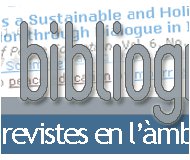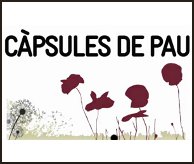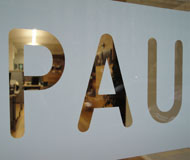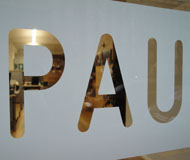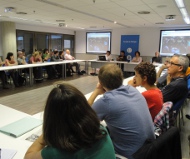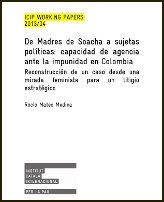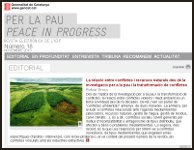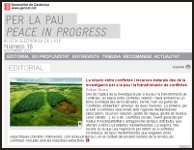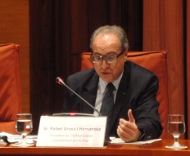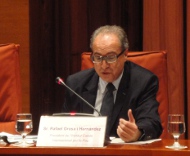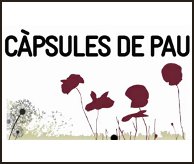Author: whads
What is Peace to Ali Abou?
A new video of the project ‘Peace Capsules’ , coproduced by ICIP and Col·lectiu Contrast, has been published this week on the ICIP website. It is a short one minute long video entitled ‘What is Peace to Ali Abou?’ and in which Abou, from Lebanese Political Prisoners in Syria Association, considers what peace means to him. The video is accessible both on the ICIP website and on the ICIP Youtube Channel .
Until the 21st September 2014, International Day of Peace, ICIP will publish a new video capsule each week. Each capsule will count with the participation of an activist, actor or academic who will think of what peace means to him/her. The aim of the project is to compile different approximations to the concept ‘peace’ on the ICIP web site.
ICIP Institutional Declaration on the occasion of the International Day of Peace
On the occasion of the International Day of Peace, which is celebrated on September 21st, ICIP has published, as every year, an institutional declaration (in catalan), a text that establishes the priorities of the Institute for the following months. Entitled ‘Educating for peace, building peace’, this year’s declaration focuses on education as the only way to build peace: ‘Educating for and building peace are two inseparable elements. Both tasks mean working on the long term, generating empathy, modeling convictions of peace and democracy, interiorizing proceedings, and changing to a positive sense very deeply rooted cultural practices’.
With this declaration, ICIP commits to place education for peace at the center of its activities on this new year that is just starting by means of new publications, new seminars, and also by means of the research project on imagined sovereignties, in which ICIP is collaborating with the Norwegian research institute PRIO.
The declaration also places education for peace as a key element to overcome the differences between Spain and Catalonia: ‘It is necessary to make sure that a conflict is really ended, to be radical and to deal with its roots, so that all parts come out of it stronger. This will only be possible if there is a will to assure the future, which implies asking democratically to know the will of the Catalan society and accepting the result’.
ICIP Institutional Declaration on the occasion of the International Day of Peace
On the occasion of the International Day of Peace, which is celebrated on September 21st, ICIP has published, as every year, an institutional declaration (in catalan), a text that establishes the priorities of the Institute for the following months. Entitled ‘Educating for peace, building peace’, this year’s declaration focuses on education as the only way to build peace: ‘Educating for and building peace are two inseparable elements. Both tasks mean working on the long term, generating empathy, modeling convictions of peace and democracy, interiorizing proceedings, and changing to a positive sense very deeply rooted cultural practices’.
With this declaration, ICIP commits to place education for peace at the center of its activities on this new year that is just starting by means of new publications, new seminars, and also by means of the research project on imagined sovereignties, in which ICIP is collaborating with the Norwegian research institute PRIO.
The declaration also places education for peace as a key element to overcome the differences between Spain and Catalonia: ‘It is necessary to make sure that a conflict is really ended, to be radical and to deal with its roots, so that all parts come out of it stronger. This will only be possible if there is a will to assure the future, which implies asking democratically to know the will of the Catalan society and accepting the result’.
A critical view on The Havana Peace talks
“The Havana Peace talks between the Colombian government and FARC are a welcome step ahead towards a transition in the country, but Colombia’s problems reach far beyond this issue and are not on the agenda at the negotiating table.” It is with this critical viewpoint that Luis Jorge Garay expresses his opinions on the subject, being one of the most well-known Colombian economists and an expert in the political and social reality of the country, in the “Assessment of a year of negotiations in Havana” conference, held on Thursday 17th of October in Barcelona and organised by ICIP, Fundació UB Solidaritat and Colombia en Pau.
Garay’s theory about present-day Colombia is clear: the traditional conflict – as he defines the guerrilla conflict of FARC – is only one of many conflicts in Colombian society. “It is not the only one – he insists – and it is becoming less and less important”. He adds that “There are many examples of systematic violence, promulgated by power groups, legal and illegal, which are fruit of a culture of illegality: drug trafficking, contraband, illegal mineral markets, etc…” Illegalities which, according to Garay, are also present in institutions, where pacts are set up between congress members and paramilitaries involved in drug trafficking, as well as within relations between the State and powerful classes: “There are external, non-state powers, unrelated to the guerrilla, that prove an obstacle to any social or political advancement in the country.”
Furthermore, the economist states that 30% of the FARC’s militancy have no interest in distancing itself from drug trafficking and will not disband, despite the Havana process. “This 30% will continue to operate on the ground, maintaining an alliance with international mafia organisations and will continue to be a focus of violence. They will not retain the name of FARC; they will adopt a different label, but they will continue to operate as illegal armed groups.”
Yet another significant element proves an obstacle in the transition towards a democratic Colombia: the fight for land and territory, which has become a central issue in the succeeding episodes of violence during the past few years. In this sense, Garay warns of a phenomenon that increases the risk of poverty and marginalisation of Colombian peasant farmers: the buying or acquisition of land by foreign capital (mostly from emerging economies), and the mass accumulation of land, which inevitably leads to financial speculation.
Garay believes that Colombia must move towards a model of rural development linked to the territory, which recognises the peasant farmer as being a rural actor and that permits the improvement of living conditions. A model, however, Garay himself recognises that neither the State nor the Elites are interested in implementing, and as such, is not on the agenda in Havana.
Finally, Luis Jorge Garay avoids speaking about a peace process in Colombia: “achieving an agreement on the disbanding of the guerrilla is useful for a transition process towards peace, but peace itself is built with markedly different social processes.”
De Madres de Soacha a sujetas políticas: capacidad de agencia ante la impunidad en Colombia
Peace in Progress: ‘Conflictes for resources’
Peace in Progress: ‘Conflictes for resources’
ICIP President presents 2012 Annual Activity Report to Parliament
The president of ICIP, Rafael Grasa, appeared before the Commission of External Action, European Union and Cooperation of the Parliament of Catalonia to present ICIP’s Annual Activity Report for 2012.
The president of ICIP summarized the activities that the Institute has carried out over these past months and the results obtained in the key areas of action: Research, Training, Dissemination and Knowledge Transfer, and Peacebuilding and Conflict Prevention.Grasa sought to highlight the effort ICIP has made to maintain a high level of activity and of publications despite the budget reduction, especially in the area of research, where 16 doctoral fellowships were maintained: “We have made an enormous effort to save the doctoral fellowship program, which is the only way to ensure that the training of new generations of specialists will continue.”
Grasa also stressed, as ICIP’s strengths, the consolidation of the ICIP Peace in Progress Award, the increase in partnerships with international organizations – for example, with Norway’s PRIO – and the work carried out in collaboration with the Library of Catalonia to recover the memory of the peace movement.
With respect to institutional matters, the president of ICIP urged the members of Parliament to proceed “ASAP” with the partial renovation of the Governing Board, which has been pending for months.
Acknowledgement of the parliamentary groups
All of the parliamentary groups present in the Commission (ERC, PSC, PP, ICV, Ciutadans, Mixed Group and CiU, in speaking order) congratulated ICIP on the work it carries out – in a difficult economic context – and expressed their gratitude for the “high level of transparency” of the Institute in its accountability to Parliament. The various groups highlighted the importance of promoting research and stressed that ICIP goes well beyond the achievement of its objectives. The parliamentarians also expressed their awareness of the need to proceed with the renovation of the Governing Board, as called for by the president of ICIP.
ICIP President presents 2012 Annual Activity Report to Parliament
The president of ICIP, Rafael Grasa, appeared before the Commission of External Action, European Union and Cooperation of the Parliament of Catalonia to present ICIP’s Annual Activity Report for 2012.
The president of ICIP summarized the activities that the Institute has carried out over these past months and the results obtained in the key areas of action: Research, Training, Dissemination and Knowledge Transfer, and Peacebuilding and Conflict Prevention.Grasa sought to highlight the effort ICIP has made to maintain a high level of activity and of publications despite the budget reduction, especially in the area of research, where 16 doctoral fellowships were maintained: “We have made an enormous effort to save the doctoral fellowship program, which is the only way to ensure that the training of new generations of specialists will continue.”
Grasa also stressed, as ICIP’s strengths, the consolidation of the ICIP Peace in Progress Award, the increase in partnerships with international organizations – for example, with Norway’s PRIO – and the work carried out in collaboration with the Library of Catalonia to recover the memory of the peace movement.
With respect to institutional matters, the president of ICIP urged the members of Parliament to proceed “ASAP” with the partial renovation of the Governing Board, which has been pending for months.
Acknowledgement of the parliamentary groups
All of the parliamentary groups present in the Commission (ERC, PSC, PP, ICV, Ciutadans, Mixed Group and CiU, in speaking order) congratulated ICIP on the work it carries out – in a difficult economic context – and expressed their gratitude for the “high level of transparency” of the Institute in its accountability to Parliament. The various groups highlighted the importance of promoting research and stressed that ICIP goes well beyond the achievement of its objectives. The parliamentarians also expressed their awareness of the need to proceed with the renovation of the Governing Board, as called for by the president of ICIP.
What is Peace to Pepe Beunza?
Until the 21st September 2014, International Day of Peace, ICIP will publish a new video capsule each week. Each capsule will count with the participation of an activist, actor or academic who will think of what peace means to him/her. The aim of the project is to compile different approximations to the concept ‘peace’ on the ICIP web site.
Jovan Divjak, winner of the ICIP Peace in Progress Award 2013
The ICIP Board of Governors has unanimously decided to grant the ICIP Peace in Progress Award 2013 to Jovan Divjak, for ‘his courage, as a General, to disobey the commands of the Yugoslav People’s Army and to defend the city of Sarajevo of the siege during the Bosnian War, and also for his latter extended work in favor of the victims of the war’.
The decision was made public last September 20, on an event organized by ICIP to commemorate the International Day of Peace, and which took place at the ICIP premises in Barcelona.
The ICIP Peace in Progress Award is granted annually and was created to laureate and publically recognize people, collectives or organizations which have worked and have contributed to the promotion of peace. The prize consists of public recognition, a sculpture created by the Nobel Peace Prize winner, Adolfo Pérez Esquivel, called Puerta del Sol, and 4,000 euros. The Award Ceremony will take place at the Parliament of Catalonia in the spring of 2014, and it will count on the presence of the winner, Mr. Jovan Divjak.
A national hero in Bosnia
Jovan Divjak was born in Belgrade in 1937 a member of a Serbian family from the Bosnian region of Bosanska Krajina. In the spring of 1992, at the start of the Sarajevo siege, Divjak was commanded from Belgrade to leave the city. However, he refused to obey and abandoned the Yugoslav People’s Army (JNA) to join the Army of the Republic of Bosnia and Herzegovina, in an act of disobedience and of commitment towards the victims of the aggression. From this new position, Divjak supervised and coordinated the defense of Sarajevo – symbol of multiethnicity- against the attack of the Serbian troupes, leaded by General Radovan Karadzic. Because of this courageous attitude, he is known as ‘the Serbian who defended Sarajevo’, even if he considers himself as a bosnian born in Belgrade, and is considered a national hero in Bosnia.
Once he retired from the military career in 1994, Divjak took part in the foundation of the Obrazovanje Gradi BiH Association OGBH (‘Education Builds Bosnia-Herzegovina’), of which he is now executive director. The OGBH Association works to ensure that all children whose families were victims of the war, no matter the ethnic group they belong to, have access to school, and provides them with grants and school materials. For his work in the association, Divjak has been publicly recognized and granted several prizes.

